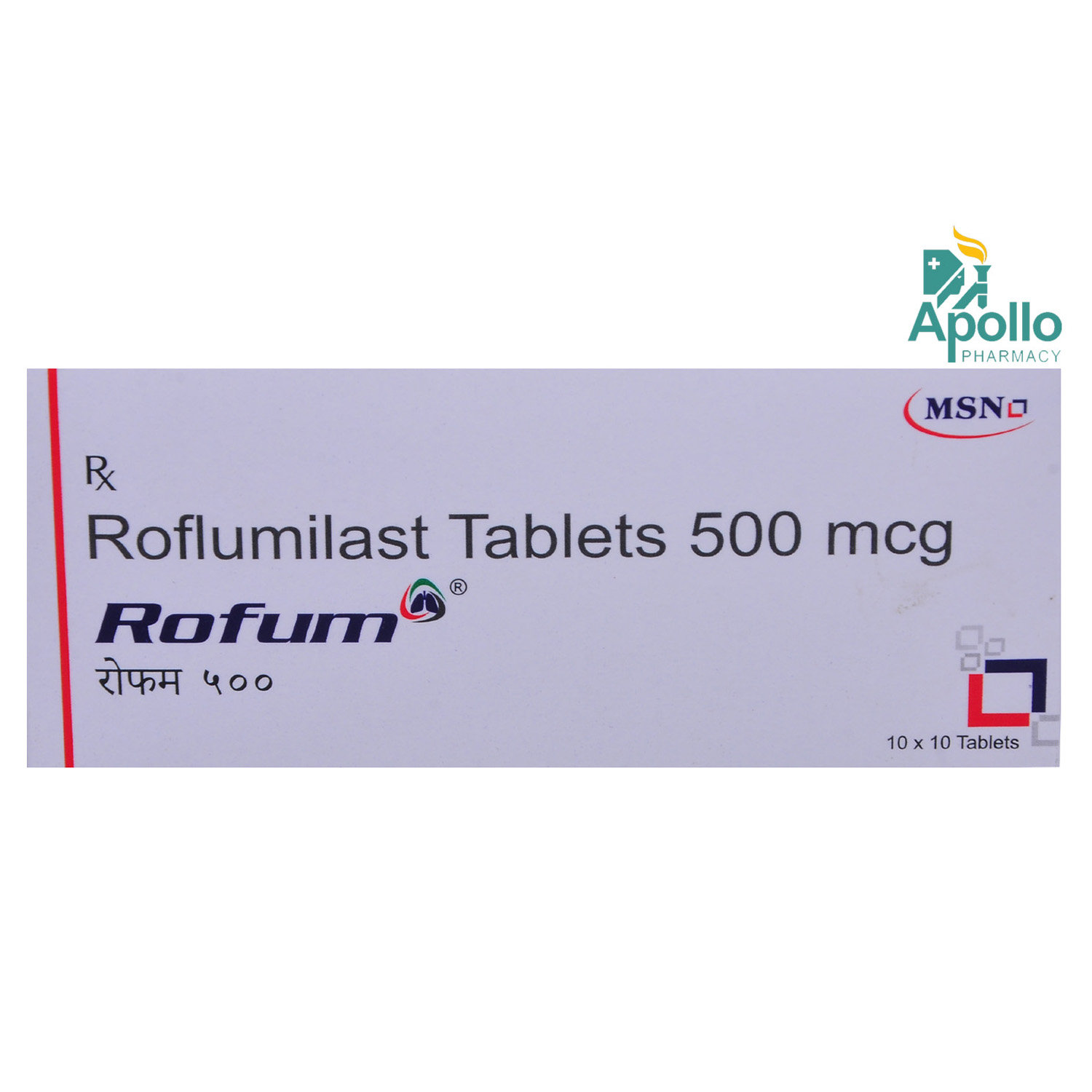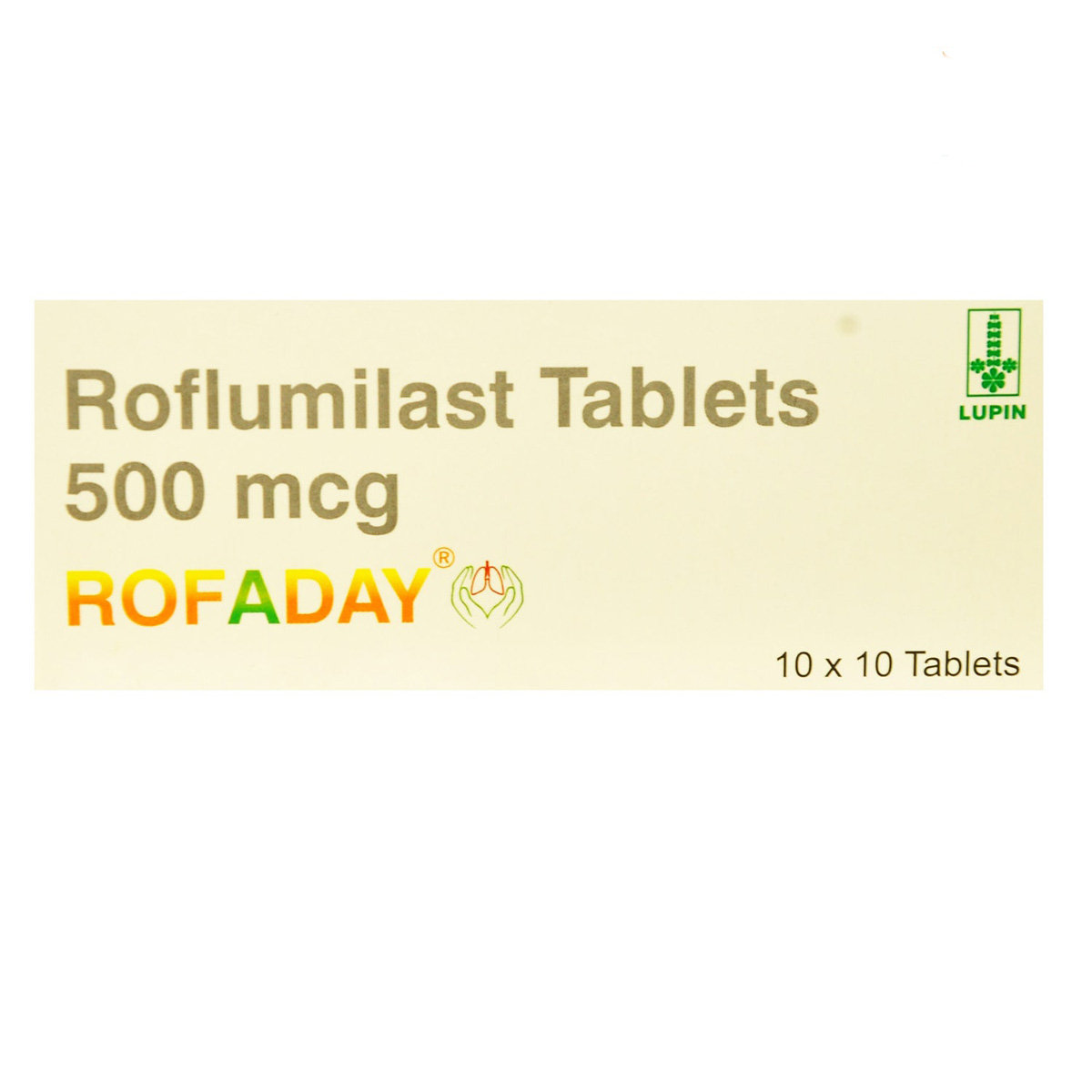Roflair Tablet
MRP ₹125
(Inclusive of all Taxes)
₹18.8 Cashback (15%)
Provide Delivery Location
Online payment accepted
 Prescription drug
Prescription drugWhats That
Composition :
Manufacturer/Marketer :
Consume Type :
Expires on or after :
Return Policy :
About Roflair Tablet
Roflair Tablet is a respiratory medicine that belongs to the class of 'phosphodiesterase inhibitors' primarily used to manage chronic obstructive pulmonary disease (COPD). Chronic obstructive pulmonary disease is a group of progressive lung diseases. It is a long-term condition which makes you hard to take breathe. People with COPD have emphysema and chronic bronchitis. Emphysema destroys air sacs in the lungs, which interferes with the movement of outward airflow. Bronchitis allows mucus to build up in the bronchial tubes by causing inflammation and narrowing of the tubes.
Roflair Tablet contains Roflumilast, which helps in the treatment of chronic obstructive pulmonary disease (COPD). Roflumilast works by relaxing the airway in the lungs and making it easier to breathe. In addition to this, Roflumilast also helps treat the symptoms. It is generally a long-term treatment.
Take Roflair Tablet with or without food or as directed by your doctor. It should be swallowed whole with a glass of water. Do not chew, bite, or break it. Your doctor will advise you how often you take your tablets based on your medical condition. You may experience diarrhoea, nausea, stomach ache, weight decrease and headache in some cases. Most of these side effects of Roflair Tablet do not require medical attention and gradually resolve over time. However, if the side effects are persistent, reach out to your doctor.
Try not to stop taking this medicine on your own. Do not stop taking Roflair Tablet despite symptomatic relief. Treat your condition effectually, continue taking Roflair Tablet for as long as it has been prescribed for you. Do not take this medicine if you have any moderate or severe liver problems. Consult your doctor before taking Roflair Tablet if you are a pregnant or breastfeeding woman. Avoid consuming alcohol along with Roflair Tablet. Roflair Tablet is not recommended for use in children and adolescents under 18 years of age.
Uses of Roflair Tablet
Directions for Use
Key Benefits
Roflair Tablet contains Roflumilast, which helps in the treatment of chronic obstructive pulmonary disease (COPD). Roflumilast works by relaxing the airway in the lungs and making it easier to breathe. In addition to this, roflumilast also helps treat the symptoms. It is generally a long-term treatment.
Storage
Drug Warnings
Do not use Roflair Tablet in more than the prescribed doses, leading to severe heart or lung problems. After taking Roflair Tablet, if you experience irregular heartbeats, leg cramps, muscle weakness, numbness or tingling, or suicidal thinking and behaviour, please consult a doctor immediately. If you have cancer, heart disease, depression, inform your doctor before taking Roflair Tablet. This medicine is recommended for use in children and adolescents under 18 years of age. Before taking Roflair Tablet, inform your doctor if you are already on medications like theophylline, oral corticosteroids, methotrexate, enoxacin or cimetidine.
Diet & Lifestyle Advise
- Smoking should be avoided while taking Roflair Tablet as it can alter the blood levels of roflumilast, which may affect the dosing.
- It is essential to maintain hygiene like washing hands after coming from outside, as people with asthma/COPD are at a greater risk of infections.
- Stay active and do regular exercise to improve quality of life and increase tolerance to shortness of breath.
- Shortness of breath can be eased by doing pursed-lip breathing exercises. In this, relax your neck and shoulder muscles, breathe in with your nose for two seconds and breathe out through pursed lips for four seconds. Such exercises will help you to improve your breath.
- Eat foods rich in potassium such as tomatoes, bananas, asparagus, oranges, potatoes, avocados, dark leafy greens and beetroots as potassium is important for lung function and a potassium deficiency may cause breathing problems.
- Drink plenty of fluids every day to thin mucus which makes it easier to cough out.
- Maintain a diet that includes complex carbohydrates such as lentils, beans, barley, oats, quinoa, bran, peas and potatoes with skin.
- Limit or avoid the intake of caffeinated drinks such as tea, coffee, soda and energy drinks.
- Eat protein-rich foods such as meat, fish (particularly salmon, sardines, and mackerel), eggs and poultry.
- Exercise regularly to strengthen your breathing muscles and boost your immune system. Learning breathing exercises will help you move more air in and out of your lungs.
- Stop smoking as it can reduce the efficacy of the Roflair Tablet and irritate the lungs and make breathing problems worse.
Side Effects of Roflair Tablet
- Diarrhoea
- Nausea
- Stomach ache
- Weight loss
- Headache
- Loss of appetite
Habit Forming
Therapeutic Class
All Substitutes & Brand Comparisons
RX
Out of StockSpirolast Tablet
Koye Pharmaceuticals Pvt Ltd
₹125
(₹11.25 per unit)
RX
Out of StockRoflu 500mcg Tablet
Zydus Cadila
₹125
(₹11.25 per unit)
RX
Out of StockRofurest Tablet
Centaur Pharmaceuticals Pvt Ltd
₹125
(₹11.25 per unit)
FAQs
Drug-Drug Interactions Checker List
- METHYLPREDNISOLONE
- BUDESONIDE+FORMOTEROL
Special Advise
- Check your weight regularly while taking this medication. Tell your doctor right away of any unusual or extreme weight loss.
- Roflair Tablet is not a bronchodilator and is not indicated for the relief of acute bronchospasm. Always carry a rescue inhaler.
Disease/Condition Glossary
COPD: It is a group of progressive lung diseases, most commonly emphysema (shortness of breath) and chronic bronchitis (inflammation and irritation of bronchial tubes). Initially, it may be mild, but it can lead to total blockage of airways and damage the lungs in severe cases. The major cause of COPD is smoking tobacco and exposure to air pollutants like asbestos and chemicals/fumes. Also, long-term exposure to fumes and chemicals may lead to COPD. The symptoms include chronic cough, shortness of breath or wheezing (whistle sound while breathing).

Have a query?
Alcohol
Safe if prescribed
The interaction of Roflair Tablet with alcohol is unknown. Please consult a doctor before consuming alcohol with Roflair Tablet.
Pregnancy
Consult your doctor
The safety of Roflair Tablet in pregnant women is unknown and is given to pregnant women only if the doctor thinks benefits outweigh risks.
Breast Feeding
Consult your doctor
It is unknown whether Roflair Tablet is excreted in human milk. It is given to breastfeeding mothers only if the doctor thinks benefits are greater than risks.
Driving
Safe if prescribed
Roflair Tablet may cause blurred vision or dizziness in some people. Therefore, avoid driving if you notice any changes in vision or feel dizzy after taking Roflair Tablet.
Liver
Consult your doctor
Do not take Roflair Tablet if you have moderate or severe liver problems. Roflair Tablet should be used with caution in patients with liver disease. Dose adjustment of Roflair Tablet may be needed. Please consult your doctor.
Kidney
Consult your doctor
If you have any concerns regarding the use of Roflair Tablet in patients with kidney problems, please consult a doctor.
Children
Safe if prescribed
Roflair Tablet should not be used in children and adolescents under 18 years of age.








